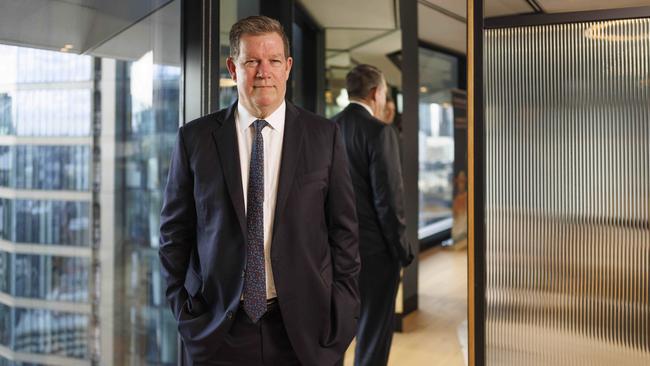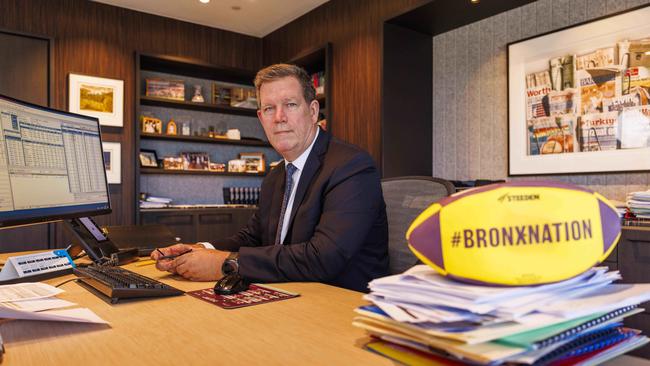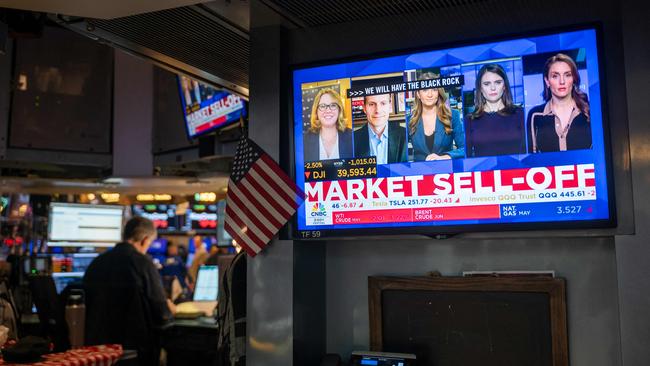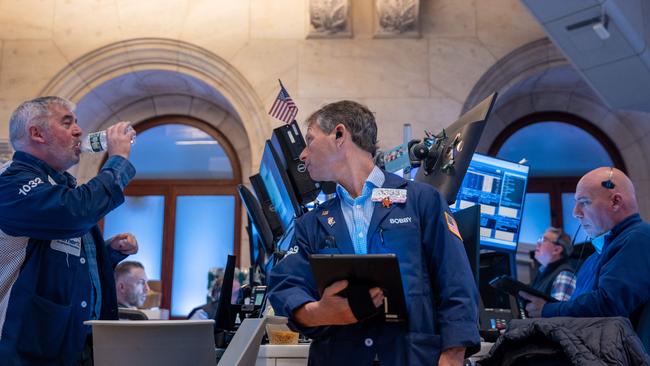Ord Minnett boss Karl Morris says there is opportunity in Trump-induced market volatility
One of Australia’s leading stockbrokers, Ord Minnett chief executive Karl Morris, says there will be more turmoil to come for world markets with Donald Trump in the White House.

One of Australia’s leading stockbrokers, Ord Minnett chief executive Karl Morris, emailed a client at 11pm on Wednesday night from his home in Brisbane saying he was expecting Thursday to be “a pretty ordinary day” on the Australian market.
“When I woke up in the morning the Dow was up by more than 2000 points,” he recalls in an interview with The Australian after a week of whipsawing markets.
“The President certainly knows how to move markets,” he said dryly, searching for the right words to sum up one of the most volatile trading weeks on the Australian market in recent years.
It meant that Morris could end the week and watch the Brisbane Broncos, which he has chaired for the past seven years, play the Sydney Roosters at Suncorp Stadium on Friday night, in a much happier mood than when he started the week, which included a major briefing for clients on Tuesday.
Morris, who started his career in stockbroking as a scrip clerk in the months before the 1987 market crash, has no illusions that there is more turmoil to come for world markets with Donald Trump in the White House.
“My view is that we have two years of uncertainty with the President, then his final two years will be about his legacy,” he says.
“The market will get used to this volatility for this issue [the Trump tariffs] and find a range.
“Investors should see this as an opportunity.”
He says Ord’s top traded shares this week were Telstra, BHP, Commonwealth Bank and Macquarie Group.

He describes the events at the end of the week as a “relief rally”, warning that the next two years of Trump’s presidency, ahead of the mid-term elections in November 2026, will continue to be a “wild ride”. He says his firm had been expecting that Trump would back down on the worst of his threatened tariffs and settle at levies of about 10 per cent, but not anywhere near as quickly as he did.
“We thought the tariffs would come back to around 10 per cent, but no one thought it would happen this week,” he says.
“The President obviously got very concerned about things. He said people were getting ‘yippy’.”
He says he believes the primary driver for Trump’s change of heart was the turmoil in the US bond market, which was seeing interest rates rising.
“They were worried that the bond market was having a meltdown,” Morris says.
“They had to provide a bit of a circuit breaker in the short term to settle markets. He dialled it back very quickly in what has been an extraordinary week.”
Morris says the firm’s clients were well placed going into this week’s market downturn in the first three days of the week as many were cashed up and looking for buying opportunities.
“We’ve seen some big moves in the markets but we have not seen any clients panicking,” he says.
“We’ve seen some clients selling but we haven’t seen panic selling as there has been in the US.”
He says the week has seen net buying by Ord Minnett clients, some of which had trimmed their portfolios and built up their cash reserves believing that the market was overpriced some time ago.
“There are two types of clients. One type is the active managers who saw [the market downturn in the first half of the week] as an opportunity to rework their portfolios,” he says.
“From the retail client point of view – the affluent and those with self-managed super funds – it’s been pretty much a non-event.
“Most firms and most clients have taken a very conservative view over the last couple of months.
“Our clients’ cash levels have gone up considerably and the buying this week has by far outweighed the selling.
“It’s always hard to buy when there is volatility and uncertainty, but a lot of people have been waiting for a bit of a pullback.
“Everyone thought the market was a bit overbought when [the S&P/ASX 200] was over 8500, and when it went under 7300 people saw it as a good buying opportunity.”

Morris points out that the global market volatility in recent weeks is very different from previous market meltdowns, such as the 1987 sharemarket crash, the global financial crisis of 2008 and the Covid sharemarket meltdown of 2020.
As an experienced broker, Morris is used to the occasional sharemarket crisis, taking the view that the best approach is to focus on investing for the long term and tell people to hold their nerve during market volatility.
“Nothing compares to the 1987 crash,” he says of his experience. “Maybe Covid or the GFC.”
But unlike the 1987 crash or even the GFC, he says, the events of recent weeks were not driven by market forces but by the actions of one man – Trump.
He points out that sharemarkets around the world have taken recent events such as the war in the Middle East and the Russian invasion of Ukraine in their stride in recent years, as well as increasing tensions between China and Taiwan, showing remarkable resilience until recent weeks.
He says the recent market meltdown was “triggered by a different type of war. It’s a war which the President is waging with tariffs to get a result which he believes can benefit his own country.
“But it has been quite extraordinary to hear his views and what they could do to world trade and globalisation.
“The market downturn was triggered by a significant change in tariff policies which has created an economic storm. It hasn’t come from a ‘black swan’ event.”
Morris says the Australian sharemarket is very different to the US market, which has active players in hedge funds and other leveraged investors, and is more subject to volatility.
He says the Australian sharemarket is also more resilient than it was in the GFC as the level of margin lending by investors is much smaller. He estimates that Ord Minnett clients collectively had about $1bn in margin loans in 2008 when the ASX was at a much lower level. These days it is down to about $300m, a much smaller proportion of the total market.
It was a sign of the times that not one of the firm’s clients this week had a margin call, despite the sharp falls earlier in the week.
Morris says this is indicative of the broader market trend, with the total outstanding margin lending in Australia now estimated to be about $15.6bn compared with $35bn in 2008.
Reserve Bank figures show that the total number of margin lending accounts in Australia has fallen from a peak of about 240,000 in 2007 and 2008 to only 77,000 as of last December.

Morris says 2008 saw several companies go bankrupt in Australia, such as Babcock & Brown, but Australian companies these days are much less leveraged and better placed to weather downturns.
He says clients in Australia went into the Trump tariff market turmoil with cash positions boosted by some top-of-the-market selling and dividend income payments. That said, he says he believes investors will still face periods of volatility ahead under the Trump presidency.
“This is going to go on for a while,” he says. “We might be having a bit of a relief rally but for the four years of the Trump presidency we will have to expect the unexpected.
“My gut feel is that during the first two years of his presidency he will do things that make America great again but for the last two years he will be more concerned about his legacy and will be less dramatic.”
He says there is still outstanding questions about future tariff levels and what impact they will have on the global economy, and a lot of uncertainty about the strength of the Chinese economy that will still have a direct impact on the Australian economy.
“We’re less exposed to the US [from the tariff and trade point of view], but our exposure to China is obviously great,” he says.
“The iron ore price has come back to $US93 a tonne, but the Aussie dollar has been smacked.
“If China slows down or goes into a recession it is going to have a big impact on their demand [for Australian resources] and their steel production.
“That’s the biggest risk we face as an export market, but we have been facing it for a few years.”




To join the conversation, please log in. Don't have an account? Register
Join the conversation, you are commenting as Logout